Nofollow Backlinks vs. Dofollow Backlinks
Oct 12, 2023
Written by Casey Bjorkdahl

Casey Bjorkdahl is one of the pioneering thought leaders in the SEO community. In 2010, Casey co-founded Vazoola after working for a Digital Marketing Agency for five years in New York City. Vazoola is now one of the fastest growing and most widely recognized SEO marketing firms in the country.
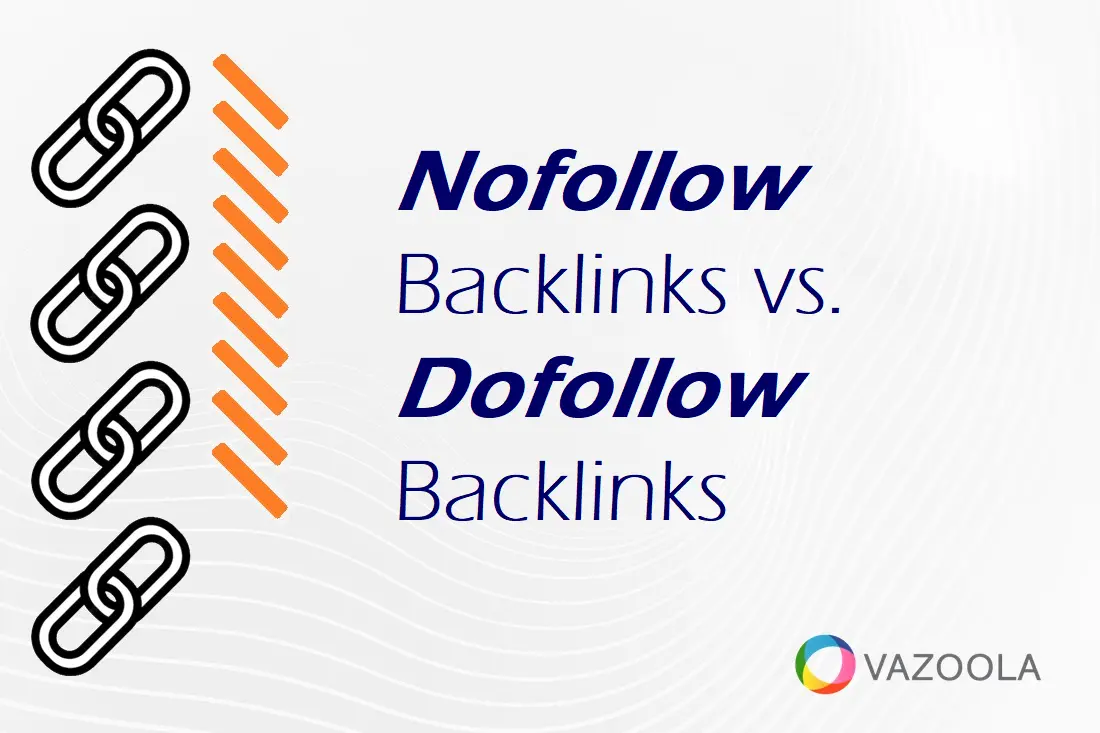
Our team at Vazoola has spent years learning the complexities of how backlinks impact the search engines. One element that consistently stands out is the role that quality backlinks play in shaping a website's search engine rankings.
The type of backlink used, whether it's a dofollow link or a nofollow link, can have a profound impact on your website's visibility in search engine results.
After all, a website's rank, not just its relevance to the query, significantly influences user engagement and click-through rates. This fact alone highlights the importance of understanding the different types of backlinks and how they affect your SEO strategy.
We've distilled down our knowledge into this guide to provide you with an in-depth understanding of dofollow backlinks and nofollow backlinks, their unique attributes, and their respective impacts on SEO.
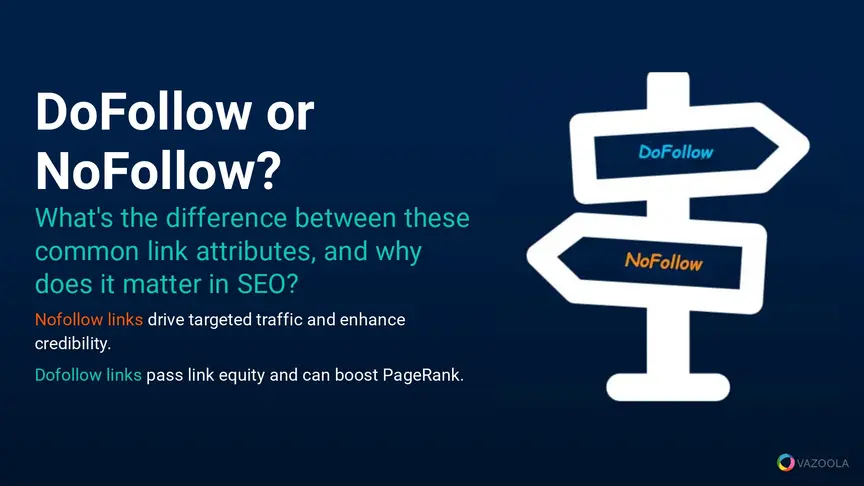
Key Takeaways:
-
dofollow backlinks vs nofollow backlinks: Dofollow links pass on link juice and can boost your PageRank directly effecting SEO, while nofollow links don't pass PageRank, but offer other benefits like driving targeted traffic and enhancing credibility.
-
Using nofollow links requires careful consideration. They are essential in specific scenarios like sponsored links, affiliate links, and user-generated content. However, misuse can skew a natural backlink profile and potential search engine penalties.
-
Knowing how to identify whether you're looking at a dofollow link or a nofollow link is essential for effective SEO management. Various methods, such as checking HTML code, using SEO extensions, and employing backlink analysis tools, can provide this information.
Table of Contents
Understanding Nofollow vs Dofollow Links
Before we get into the technical details, it's essential to establish a foundational understanding of the two primary types of backlinks: dofollow and nofollow.
These types of external links have unique characteristics that directly influence how search engines like Google interpret and rank your web page.
Our recommendation: Over 10 years of operating our link building service has taught us that a nuanced understanding of these backlink types is essential for anyone serious about improving their website's SEO.
So what's the difference between nofollow and dofollow links, and what are their characteristics?
How do dofollow and nofollow links fit into the broader context of SEO, and why should these types of external links be a focal point in your digital marketing efforts?
What is a Dofollow Link?
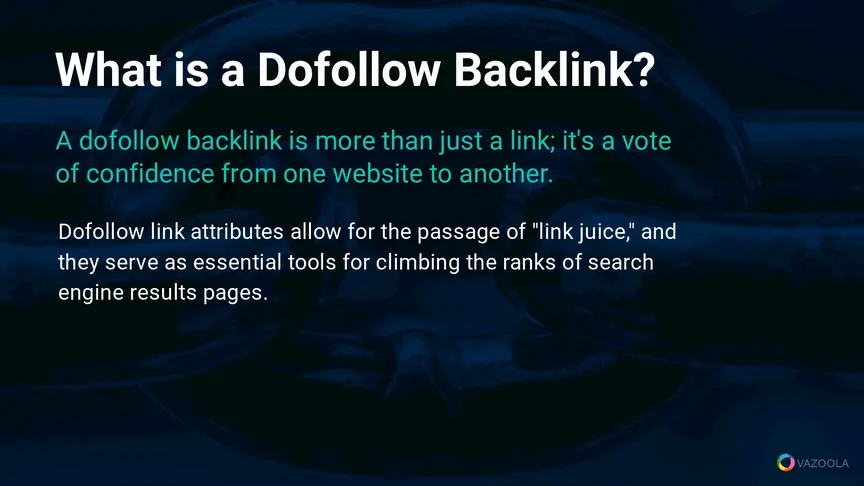
A high quality dofollow link is more than just a link; it's a vote of confidence from one website to another.
When a site links to yours with a dofollow backlink, it signals to search engines that your destination site and content is valuable and trustworthy.
This type of backlink, therefore allows for the passage of what SEO professionals have called "link juice," a colloquial term used to describe the SEO value transferred from one website to another.
Our recommendation: Years of experience has shown us that a well-placed dofollow link can significantly improve website traffic, increase revenue, and boost your site's authority in the eyes of search engines.
These backlinks are essential tools for climbing the ranks of search engine results pages and should form a key component of any robust SEO strategy. In fact, dofollow links are particularly effective for targeting specific keywords, and they can play a crucial role in your site's overall SEO health.
What is a Nofollow Backlink?
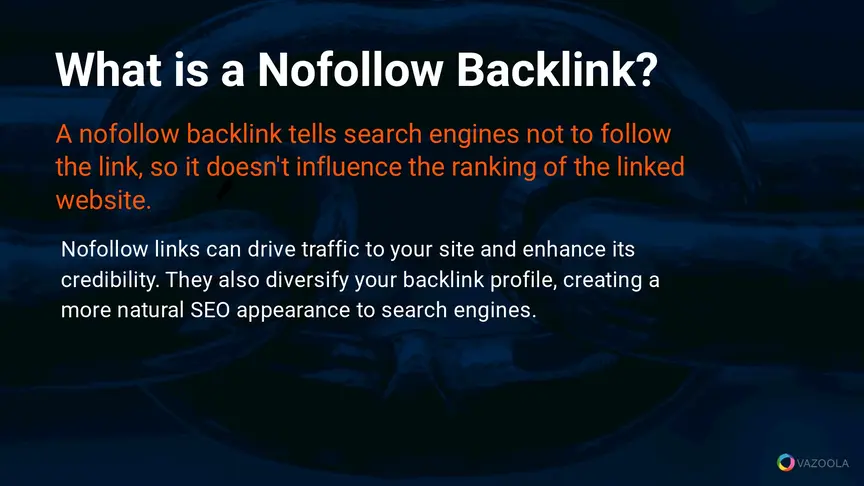
On the flip side, a nofollow backlink serves a different but still important purpose.
When you receive a nofollow backlink from other websites, it comes with an instruction to search engines not to follow the link, effectively saying that the link should not influence the ranking of the linked website.
While nofollow links don't pass "link juice" and therefore have a less direct impact on SEO, they are far from useless.
Our recommendation: Nofollow links can still drive substantial traffic to your site and enhance its credibility. They are particularly useful for diversifying your natural backlink profile with all the external links, which can make your SEO strategy appear more natural to search engines. A website with zero nofollow links could sent up a red flag for potential black-hat SEO tactics.
Likewise, nofollow links can be a valuable resource for building relationships with other websites and for participating in online communities related to your industry.
In other words, both dofollow and nofollow links impact SEO.
The History of the Nofollow Link
Google introduced the concept of the nofollow link back in 2005 as a way to combat spammy websites and improve the overall quality of search results.
Before this innovation, the world of SEO was more or less the Wild Web, with site owners employing all sorts of tactics to artificially inflate their search ranking.
The introduction of the nofollow attribute brought a level of order and fairness to the SEO landscape. It allowed website owners to have more control over which links passed SEO value, thereby reducing the effectiveness of spammy backlinking practices or other manipulative tactics.
Over the years, the role of the nofollow link has evolved, but its core purpose remains the same: to give website owners greater control over their SEO strategies and to maintain the integrity of search results.
The attribute has become a standard feature in modern SEO practices and continues to influence how backlinks are used for ranking.
Other Link Types
While dofollow backlinks and nofollow links are the most commonly discussed types of backlinks, there are other variants that you should be aware of. These other types of link attributes also play a role in your overall SEO strategy and can be leveraged for specific purposes.
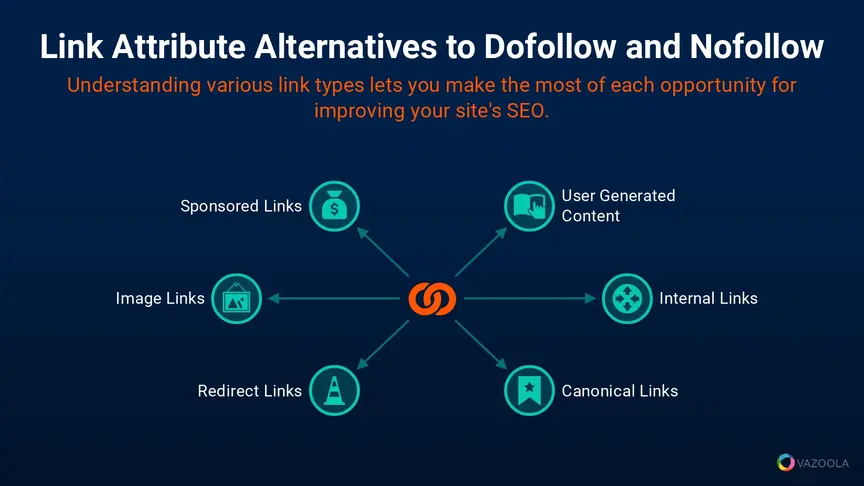
Understanding other link types can provide you with a more nuanced approach to backlinking, allowing you to make the most of each opportunity for improving your site's SEO.
When crafting your overall link building strategy, keep in mind the following alternative link attributes:
-
Sponsored Links: Paid links that come with a rel="sponsored" attribute informs search engines that the link is an advertisement and, much like a nofollow attribute, should not pass link equity. Sponsored links are useful for driving targeted traffic but have limited SEO value. They are often used in paid partnerships and advertising campaigns.
-
UGC Links: Short for User Generated Content, these links are typically found in forums, blog post comments, and other sites where users can post content. They come with a rel="ugc" attribute, signaling to search engines that the link may not be editorially controlled and should be treated with caution. UGC links can be valuable for building community engagement with less risk of comment spam, but should be monitored for quality.
-
Internal Links: Internal links are those that point to other pages within the same website. While they don't bring in external link juice, they are crucial for site navigation and can help distribute link juice internally. Internal links are essential for creating a cohesive user experience and can contribute to improved SEO for your entire website.
-
Canonical Links: Links that come with a rel="canonical" attribute tell search engines that the linked page is the preferred version of a set of duplicate pages. Canonical links are essential for preventing duplicate content issues, which can negatively impact SEO. They help search engines understand which version of a page to index and rank, thereby preserving the SEO value of the original content.
-
Redirect Links: These are links that automatically forward users from one URL to another. They are often used when a webpage has been moved or deleted. While they don't directly pass link equity, properly configured 301 redirects can help preserve some of the SEO value of the original page. It's crucial to use redirects judiciously to avoid confusing search engines and users.
-
Image Links: Links embedded within an image rather than text can be visually engaging, but they often lack the SEO benefits that come with text-based links. To maximize their SEO value, it's advisable to use descriptive alt text and ensure that the image is relevant to the linked content.
Pro Tips:
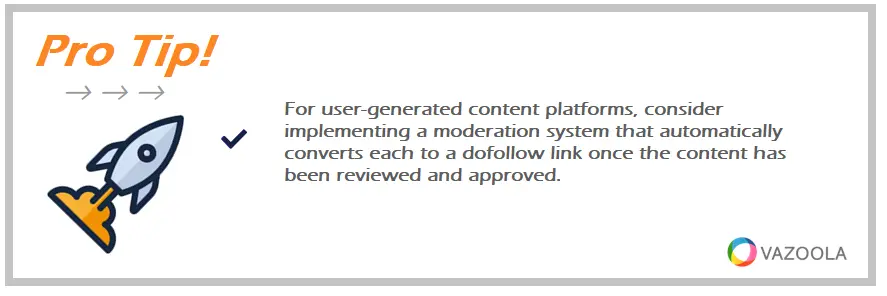
For user-generated content platforms, consider implementing a moderation system that automatically converts each to a dofollow link once the content has been reviewed and approved.
SEO Impact of Dofollow and Nofollow Links
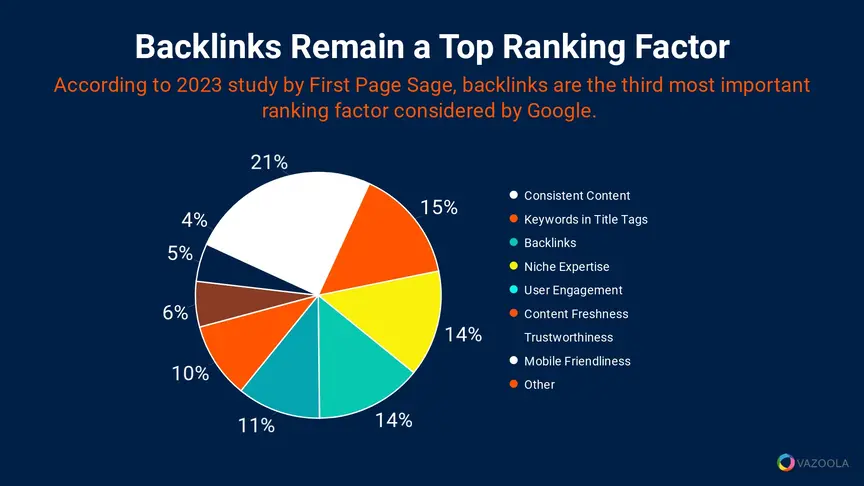
When it comes to optimizing your website for search engines, understanding the different types of backlinks and their impact on SEO is crucial.
According to a recent study from First Page Sage, Google places slightly less weight on backlinks as a ranking factor than in the past. Still, they account for about 14% of a site's search rank, making them one of the most important elements to consider in your SEO strategy.
Keep reading as we explore the intricate ways dofollow and nofollow links affect various SEO metrics, including Google's PageRank algorithm, and provide you with actionable insights based on our extensive experience in the field.
What Is PageRank and How Is it Affected By Dofollow Links?
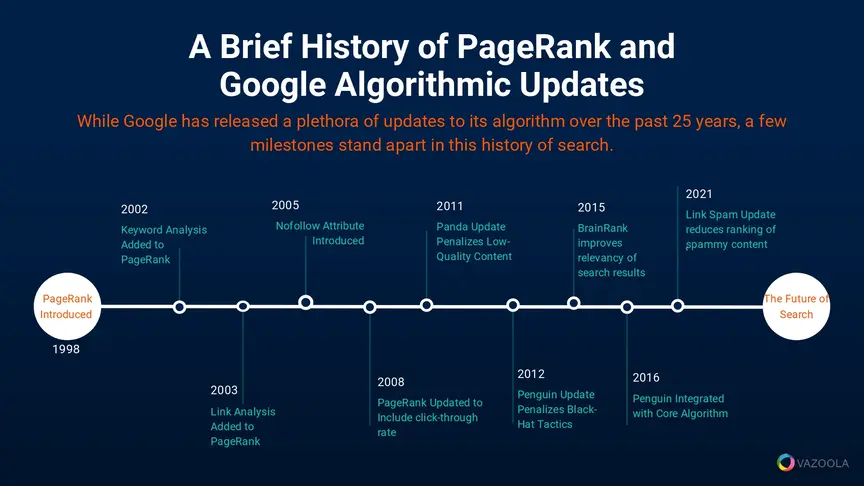
PageRank is an algorithm developed by Google founders Larry Page and Sergey Brin while they were at Stanford University.
Initially designed to rank academic papers, it has evolved into a cornerstone of Google's search algorithm. PageRank works by evaluating the number and quality of links to a page, thereby determining a website's authority or importance.
Over the years, Google has refined this algorithm to consider various other factors, but the core principle remains the same: links matter.
Dofollow links play a significant role in influencing PageRank.
When a website with high authority links to your site using a dofollow link, it passes on some of its PageRank to your page. Often referred to as "link juice," this tactic can significantly boost your website's authority and ranking.
Our experience has shown that a well-placed dofollow link from a reputable source can have a lasting impact on your PageRank, making it a vital component of any SEO strategy.
Pro Tips:
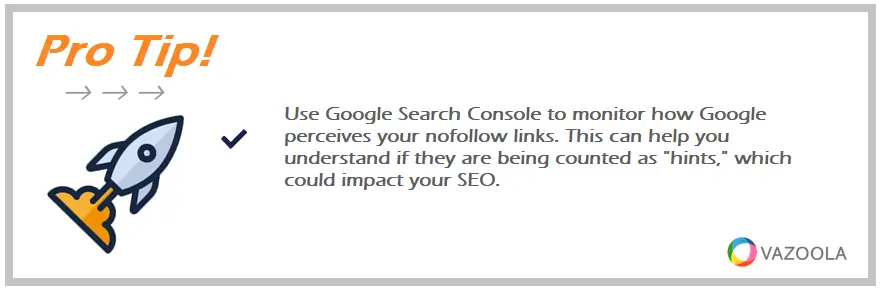
Use Google Search Console to monitor how Google perceives your nofollow links. This can help you understand if they are being counted as "hints," which could impact your SEO.
Nofollow Backlinks and SEO
Nofollow links have a different but still important role in SEO.
Unlike dofollow links, they don't pass on PageRank and are generally not followed by search engines.
However, Google's stance on nofollow links has evolved over the years.
With the introduction of algorithmic updates like Penguin, Google has grown more sophisticated in how it evaluates nofollow links. While they may not pass on SEO value in the traditional sense, they are far from being ignored by search engines.
Do Nofollow Links Help With SEO?
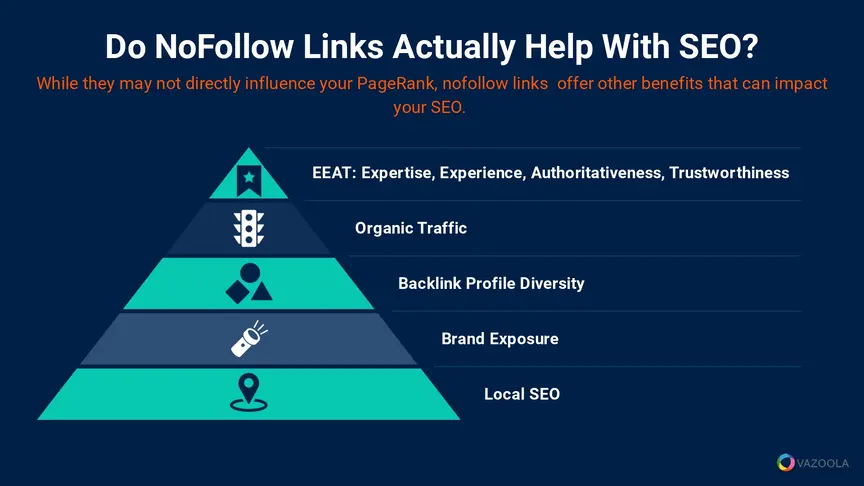
Nofollow links can be considered unlinked mentions that still have a role to play in your SEO strategy.
While they may not directly influence your PageRank, they offer other benefits that can indirectly impact your SEO. In fact, nofollow links can be beneficial in a few different ways, including:
-
Traffic: Nofollow links can drive targeted traffic to your website, which can lead to increased engagement and potentially more links, particularly dofollow links.
-
EEAT (Expertise, Experience, Authoritativeness, Trustworthiness): Having nofollow links from reputable sources can enhance your website's credibility, which is a factor considered by Google's algorithm.
-
Link Profile Diversity: A mix of dofollow and nofollow links makes your backlink profile look more natural, which search engines prefer.
-
Brand Exposure: Nofollow links can increase your brand's visibility online, leading to more organic search queries related to your brand.
-
Local SEO: Nofollow links from local directories or news websites can improve your visibility in local search results.
Is it bad to have nofollow backlinks?
Contrary to some outdated beliefs, having nofollow backlinks is not detrimental to your SEO efforts. In fact, they can offer several benefits and are considered white hat backlinks in many cases.
There was a time when nofollow links were considered to have little or no value. However, the SEO landscape has evolved, and so has the value attributed to nofollow links.
They now play a role in creating a diverse and natural-looking backlink profile, driving targeted traffic, and enhancing your website's credibility.
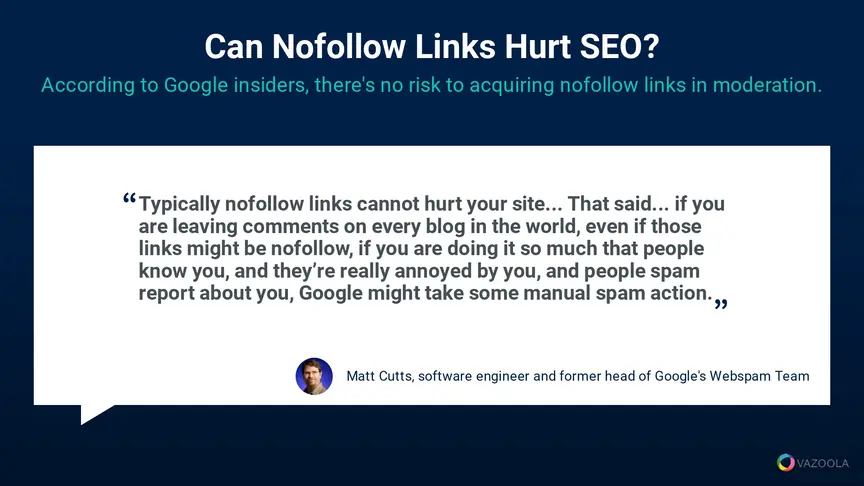
Using NoFollow Links
Unlike dofollow backlinks, nofollow links do not pass link juice. Yet, they still hold value in a well-rounded SEO strategy. However, it's crucial to exercise caution when implementing them.
Misusing nofollow links can lead to a skewed backlink profile, which search engines may interpret as manipulative or unnatural. That could result in penalties that negatively impact your website's search rankings.
Likewise, indiscriminate use of nofollow links can also dilute your site's overall authority, as you may miss out on valuable opportunities to pass on link equity where it could be beneficial.
Therefore, understanding when and how to use the no follow link effectively is essential.
When to Use Nofollow Links
So, when should you add nofollow links?
Before diving into the specifics, it's important to understand that using nofollow links inappropriately can have repercussions ranging from missed opportunities for passing on valuable link juice to potential penalties from search engines.
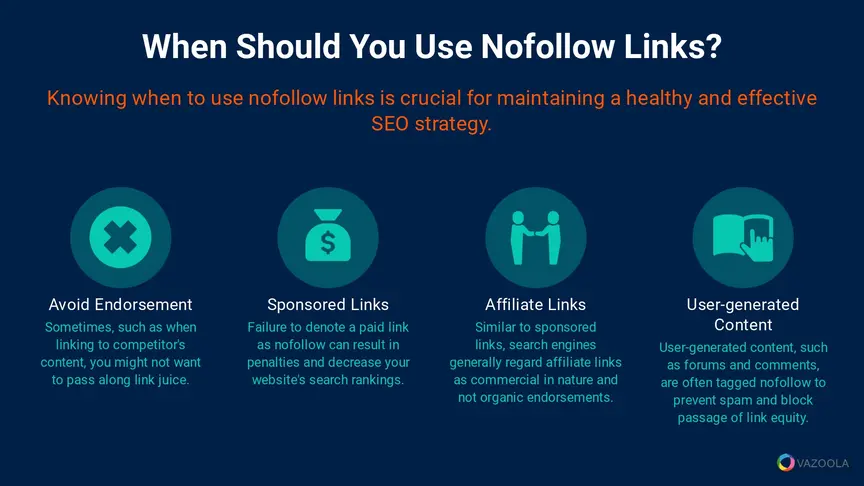
Therefore, knowing when to use a nofollow tag is crucial for maintaining a healthy and effective SEO strategy.
Pages You Don't Want to Endorse
There are instances where you may want to link to a destination site without necessarily endorsing it. For example, you might reference a competitor's product or a controversial article. In such cases, using a nofollow tag ensures that you don't pass on any link equity to the page, thereby not boosting its authority.
Sponsored Links
When you're paid to place a link on your website, it's essential to mark it as a sponsored link with a nofollow attribute. This is not only a best practice but also a requirement by Google. Failing to do so can result in penalties that could severely impact your website's search ranking with Google and other search engines.
Affiliate Links
Much like sponsored links, affiliate links should also carry a nofollow attribute. This is because search engines generally regard these links as commercial in nature and not as organic endorsements. Using a nofollow link in this context ensures that you comply with search engine guidelines while still benefiting from potential affiliate revenue.
User-generated Content
If your website has sections where users can post content, such as forums or comments, it's advisable to use nofollow links. With this html tag applied, you help prevent comment spam and ensure that the forum posts with these links do not pass on link equity, as they are not editorially controlled by you.
When NOT to Use Nofollow Links
Just as there are times when using a nofollow link is advisable, there are also instances when it's best to avoid them.
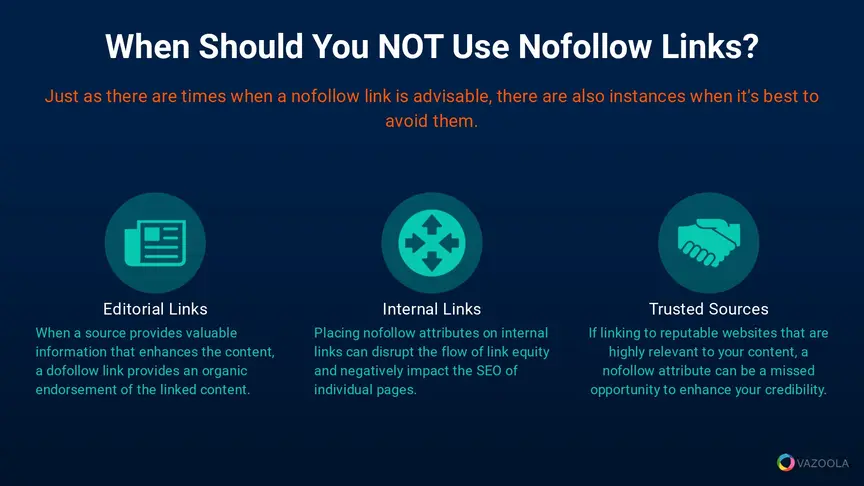
Failing to insert links with a dofollow attribute where appropriate can result in missed opportunities to pass on valuable link juice, which can be crucial for improving your site's search rankings.
Editorial Links
When you're linking to a source because it provides valuable information that enhances the content quality, a dofollow link is generally the best choice. This is an organic endorsement of the linked site and content, and search engines should be aware of this relationship.
Internal Links
Using nofollow attributes on internal links can disrupt the flow of link equity throughout your site, which can negatively impact the SEO of individual pages. Internal links should generally be dofollow to ensure proper distribution of link equity.
Trusted Sources
If you're linking to reputable websites that are highly relevant to your content, using a nofollow attribute can be a missed opportunity. Trusted sources like guest posts can enhance your content's credibility and should be endorsed with dofollow attribute links whenever appropriate.
By understanding when to use and when not to use nofollow links, you can craft a more effective and balanced SEO strategy. Such a nuanced approach will help you maximize the benefits of both dofollow and nofollow links, thereby improving your website's overall search performance.
Pro Tips:
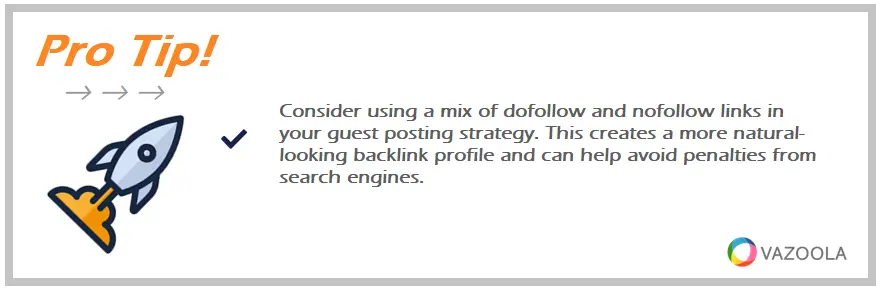
Consider using a mix of dofollow and nofollow links in your guest posting strategy. This creates a more natural-looking backlink profile and can help avoid penalties from search engines.
How to Determine Whether a Link is Nofollow
Understanding the type of backlinks associated with your website is crucial for optimizing your SEO strategy.
Whether you're conducting a comprehensive backlink audit or simply scrutinizing individual links on your site, knowing whether a link is nofollow or dofollow can significantly impact your approach.
For example, if your goal is to build link equity, securing more dofollow links will be a priority.
On the other hand, if you're looking to maintain a balanced backlink profile, you'll also want to include nofollow links.
But, how exactly do you determine if a link is nofollow? Is there more than merely looking for the "rel nofollow" attribute? Fortunately, a few strategies can help get the job done.
Check the HTML code
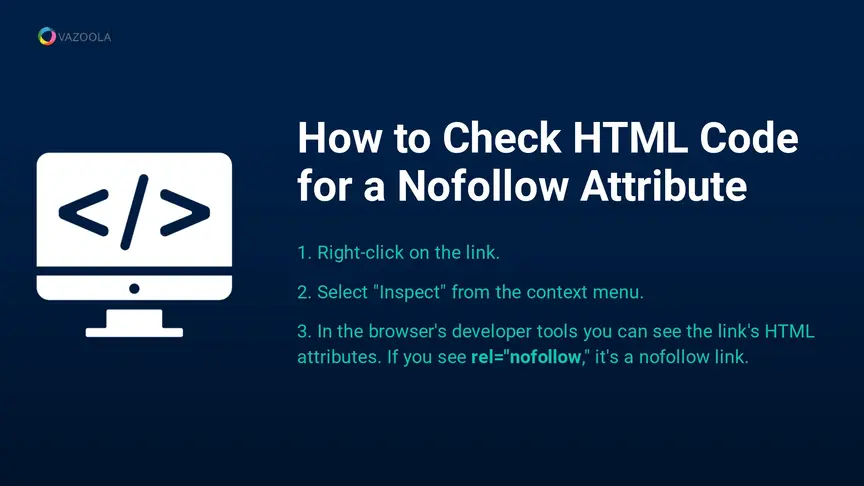
One straightforward way to determine if a single link is nofollow is by inspecting its HTML code for a rel nofollow attribute.
To check the HTML code for a link attribute, right-click on the link and select "Inspect" from the context menu that appears.
This will open the browser's developer tools, where you can see the link's HTML attributes, including the. If you see "rel=nofollow" within the link tag, then it's a nofollow link.
This method is particularly useful for checking individual links quickly and is a fundamental skill anyone involved in SEO should possess.
SEO Extensions
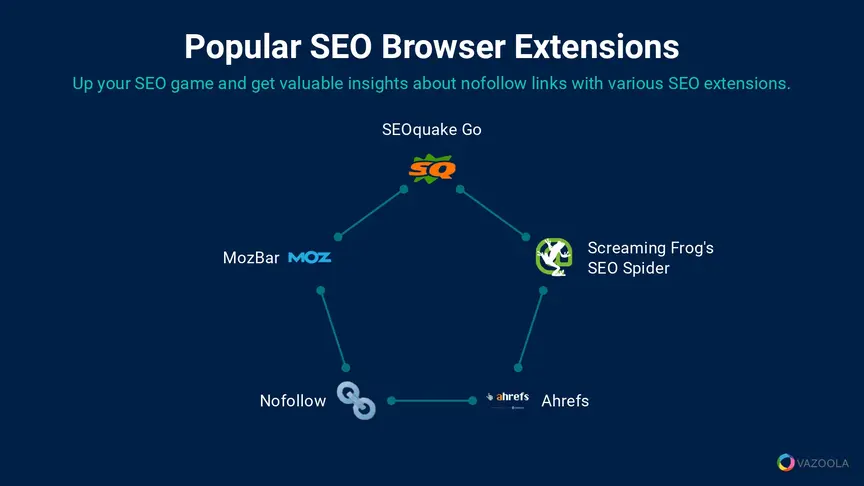
Great for outbound links, browser extensions designed for SEO can also help you quickly identify the nature of links.
Extensions like MozBar or SEOquake can show you whether a link is nofollow or dofollow without requiring you to sift through HTML code.
This is especially useful for analyzing multiple outbound links on a page, saving you time and effort. These tools often come with additional features that can aid in a more comprehensive SEO analysis.
Backlink analysis tools
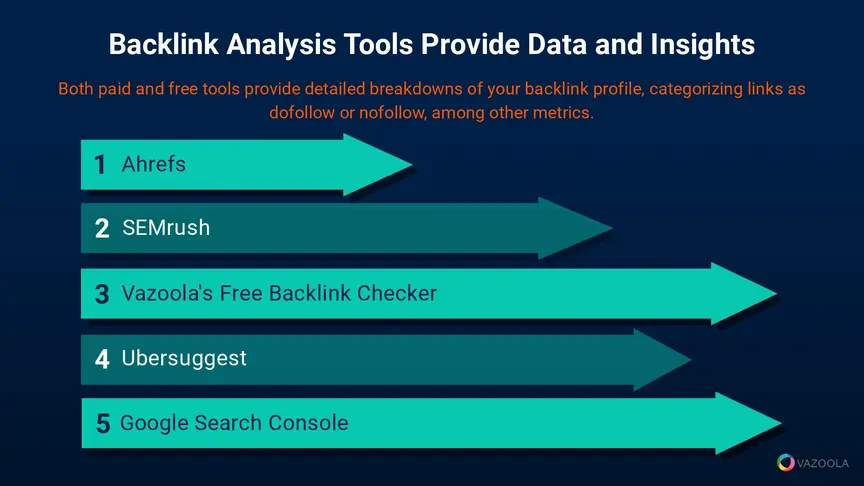
For a more in-depth analysis, especially of backlinks, tools like Ahrefs or SEMrush are highly effective at backlink audits.
These platforms provide a detailed breakdown of your backlink profile, categorizing links as dofollow or nofollow, among other metrics. The analysis of other competitor backlink profiles also can help you with new keyword ideas.
Understanding the nature of your inbound links is crucial for assessing how other websites interact with yours, which in turn can influence your site's authority and impact search engine rankings.
By employing these methods, you can gain a comprehensive understanding of your backlink profile, allowing you to make informed decisions that will positively impact your SEO strategy.
Pro Tips:
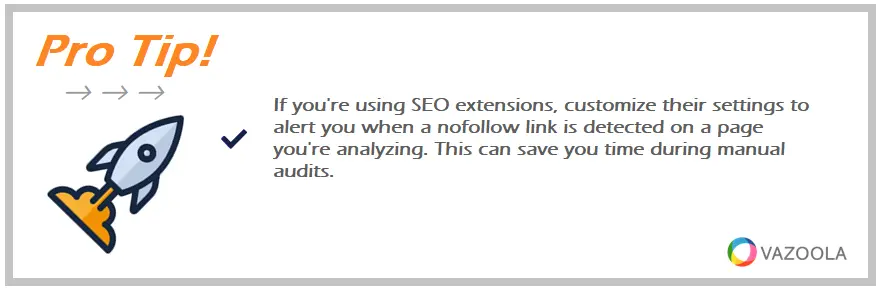
If you're using SEO extensions, customize their settings to alert you when a nofollow link is detected on a page you're analyzing. This can save you time during manual audits.

